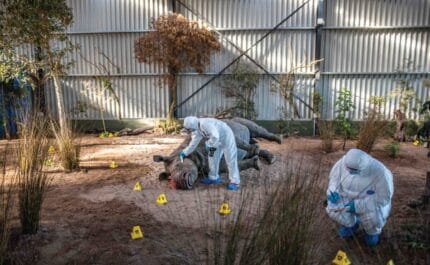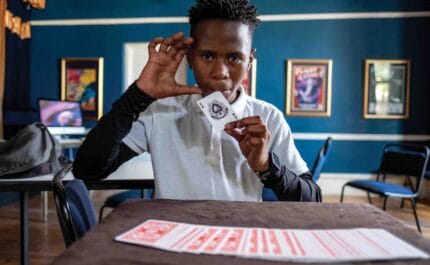Dropping the ball
On 7th June London Irish became the third Premiership team to fail in a single season. How did English rugby fall apart so quickly? And is there any way out of the downward spiral?
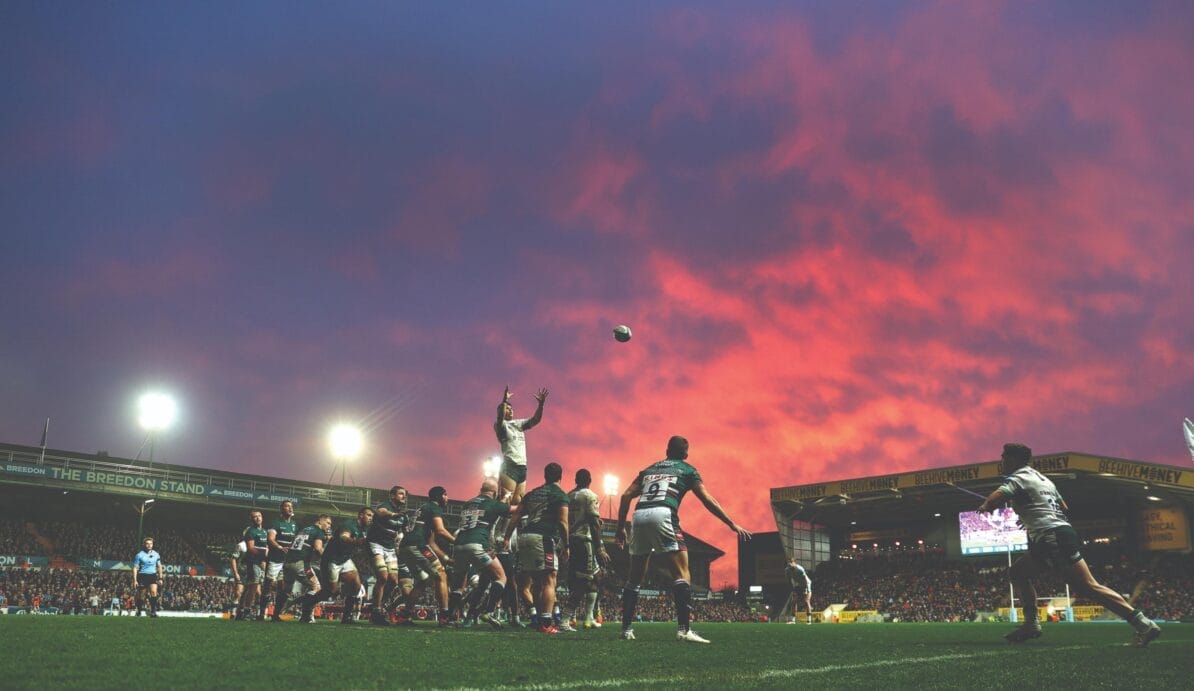
A London Irish player leaps for the ball during a match against Leicester Tigers on 27th November 2022. The season would be the club’s last before entering administration and being ejected from English rugby. Photo: David Rogers/Getty Images
7th June 2023 (Taken from: #51)
On Tuesday 18th July, the fixture list for the forthcoming 2023/24 Premiership rugby season was released. Duncan Kendall – a fan of London Irish for nearly 20 years, a season ticket holder and vice-chairman of the club’s supporters’ committee – felt sick.
“To not see Irish on there… it was just horrible. Heartbreaking,” he recalls. Following a thrilling 2022/23 season, which saw their highest finish in a decade, the club had filed for administration on 7th June 2023, after missing a deadline to pay players and staff. After a protracted saga, a hoped-for takeover by a vague American consortium had not materialised.
Formed in 1898 by Irish workers who had moved to the capital, London Irish first took to the field when Queen Victoria was on the throne. Players and supporters proudly called themselves the “Exiles”, a moniker that has taken on new meaning. After 125 years the club has found itself barred not just from the top flight but from playing in any league in England. “It felt – feels – like the death of a close friend,” says Kendall. “Someone you used to go to the pub with every other week, maybe the occasional camping trip. You can go off to meet their brother or sister and have a couple of pints, sure, but it’ll never be the same.”
Kendall, a 62-year-old software engineer from Reading, first fell under the Exiles’ spell when the club relocated to Berkshire in 2000 having outgrown its spiritual home in Sunbury, on the fringes of London. An enthusiastic if undistinguished player in his day, he found a home and community with what players and fans proudly called the Exile Nation.
The on-field highs roll off his tongue. The narrow Premiership final defeat against Leicester in 2009 in front of 82,000 at Twickenham. The 23-17 victory over mighty Munster in October 2010, when 20,000 fans packed into Reading’s Madejski Stadium, Irish’s home ground.
The itinerant club was on the move again in 2020, destined for the Gtech Community Stadium in Brentford. The club was now closer to its geographical roots, and especially to its fierce rivals Harlequins, an enmity that began when Irish and Quins briefly shared the latter’s Twickenham Stoop ground. A period summed up succinctly by former England winger Paul Sackey, a London Irish player at the time: “We hated them in all fairness, we really did”. But at the Gtech, the good times rolled. Footage of Henry Arundell’s length-of-the-field try against Toulon in May 2022 went viral and the 20-year-old full-back was fast-tracked into the England squad. Two days before Christmas, Irish lit up their new home as they took down the Premiership’s eventual champions, Saracens, in a pulsating Friday night game. “We totally outplayed them,” says Kendall, suddenly animated by the memory.
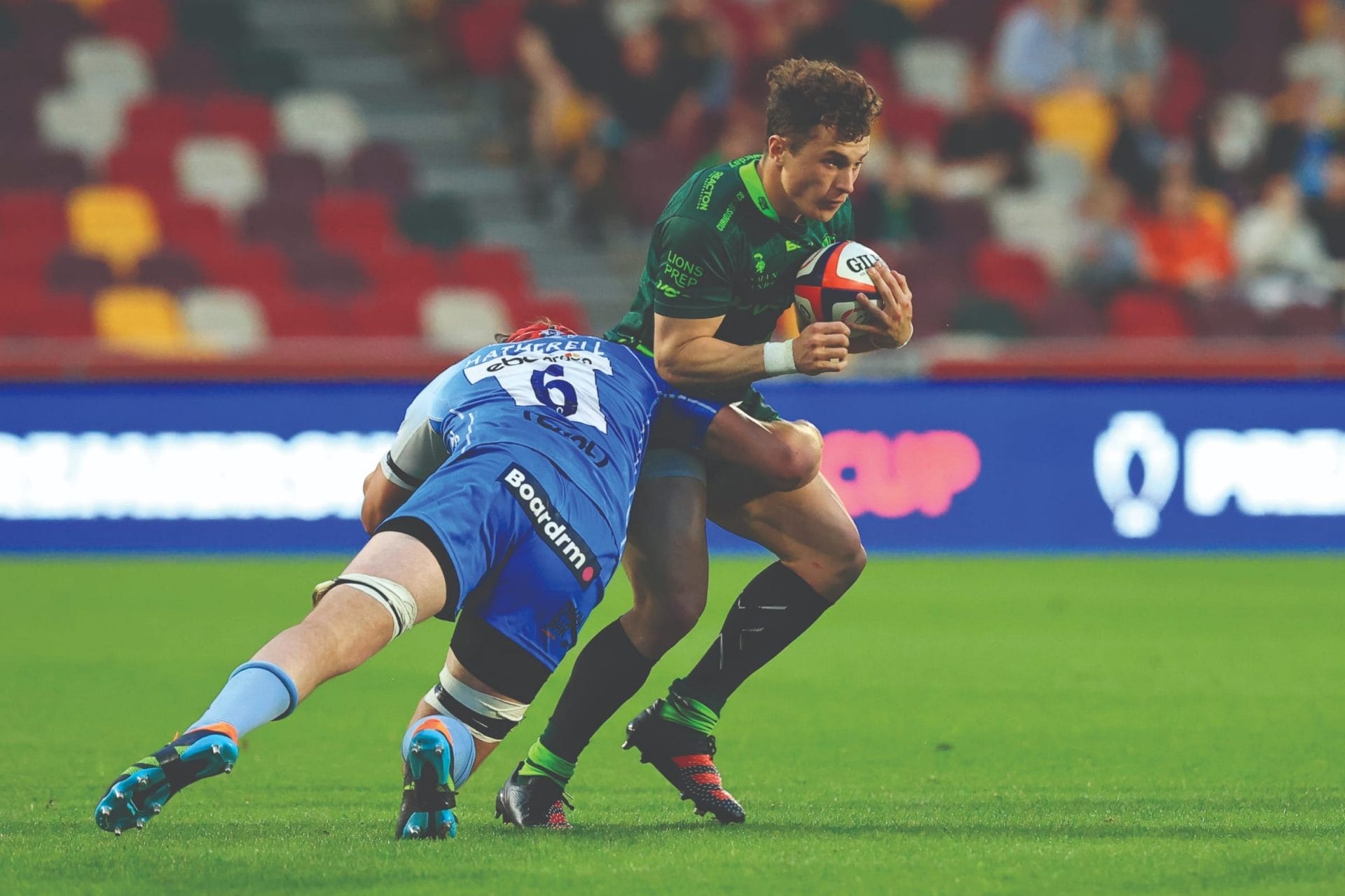
Henry Arundell of London Irish is tackled by Kyle Hatherell of Worcester Warriors during the 2022 Premiership Rugby Cup final. Within a year both clubs would enter administration. Photo: David Rogers/Getty Images
But off the field, uncertainty was swirling. After years of financial losses, recycling tycoon Mick Crossan – who bought London Irish in 2013 and pumped millions into the club – offered to give it away for nothing in October 2022. Six months later, the Exiles’ finely tuned squad was being prised apart like a vintage Aston Martin at a scrapyard.
The collapse was a sporting and community tragedy, depriving tens of thousands of supporters such as Kendall of their passion, and leaving scores of players, coaches and medical and backroom staff jobless. Yet remarkably it was merely a footnote, the final bloody act, in what will surely go down as a season from hell in the birth nation of rugby. Player-welfare lawsuits relating to early-onset dementia; bungled law changes; threatened strikes; sponsors jumping ship; refereeing controversies; a racism and sexism scandal; players abandoning the amateur game in their droves; unions left flailing. The sport in Britain lurched from disaster to disaster, nudging ever close to an existential crisis.
The financial mayhem was most conspicuous. The collapse of London Irish was preceded by the failure of two other Premiership teams, both based in the west Midlands: Worcester Warriors and Wasps – the latter, one of the biggest brands in world rugby and two-time European champions. That’s akin to football’s Premier League seeing a Liverpool, a West Ham and an Aston Villa go bust in a single season.
Between them, the trio of condemned clubs boasted 433 years of history – and a debt millstone weighing in at nearly £180m. The furore reached all the way to the House of Commons; the Department of Culture, Media and Sport (DCMS) labelled it a “debacle” in a report that branded professional rugby finances “clearly unsustainable”. It upbraided the Rugby Football Union (RFU), the governing body of the game in England and the richest union in the world, for watching on with bovine inertia. So too the league’s owner and operator, Premiership Rugby Limited (PRL). The demise of the clubs was, said the government report, “a stain on their reputations”.
Now reduced to ten teams, the Premiership isn’t out of the woods. A report by the DCMS published in October 2022 estimated the debts accumulated by the 13 Premiership clubs that began the 2022/23 season at close to half a billion pounds, with Bath, Saracens and Bristol all further in the red than the now-deceased London Irish.
You think it’s a bad dream and we’ll wake up and be back at the ground next Saturday. All that history can’t just go down the pan”
Covid certainly exacerbated matters, with games played behind closed doors and clubs forced to stockpile more debt in the form of lifeline loans from Sports England, which were ultimately guaranteed by the UK government. But that’s only part of the story, as fans knew only too well. “To lose two clubs, to paraphrase Lady Bracknell, looks like carelessness,” wrote John Greene, from Leicester, in a letter published in Rugby World magazine in September. “To lose three looks like financial mismanagement.”
Just under 100 miles northwest of the swanky 17,000-seat Gtech Community Stadium in Brentford – now, after Irish’s departure, the exclusive home of Brentford FC – is another sporting cathedral. Little more than an errant box-kick from the M5 and named for the starburst of roads that radiate from the junction on which it sits, this is Sixways – the home of Worcester Warriors. If London Irish was the last domino to fall, Worcester was the first. On 26th September 2022, just three games into the season, the club went into administration over an unpaid £6m tax bill, with debts of over £30m. The contracts of all players and coaching staff were terminated a few days later.
It was an ignominious end for a hard-working club built in the image of its greatest advocate, entrepreneur Cecil Duckworth, pioneer of the Combi Boiler. Duckworth diverted his £40m fortune into local philanthropy and, from 1997, his beloved Worcester Warriors – helping to transform it from an amateur team languishing in the lower leagues to a top-flight outfit, before taking more of a backseat role a decade ago. He passed away in November 2020, and so never got to enjoy its finest hour. On 17th May 2022, the club won the first silverware in its history – the Premiership Rugby Cup (against London Irish, ironically). The Gold & Blues were trailing 18-25 deep into injury time before flanker Kyle Hatherell burst over to score and take the game to extra time. “It’s Worcester – back from the dead!” exclaimed the commentator breathlessly.
Carson Wishart was there, as he was at pretty much every Worcester match for a dozen seasons. As a commentator for BBC regional radio, he didn’t just see the highs and lows, he articulated them. “It was the most extraordinary game,” he remembers. “Delirium. To see the Warriors winning silverware having struggled so much… You remain professional, but when it brings a tear to your eye you know it’s a special club.” He pauses, still emotional even more than a year on. “That was one of their very last games. You think it’s a bad dream and we’ll wake up and be back at the ground next Saturday. All that history can’t just go down the pan.”
Wishart is sitting in the Horn & Trumpet, in central Worcester, on a Friday lunchtime. There’s rugby ephemera everywhere. Banners. Team photos. A giant inflated rugby ball hangs over the bar. In happier times, Warriors season ticket holders would gather here pre-match. Away fans, too – travelling groups from Newcastle or Saracens, fuelling up on beer and banter before heading over to Sixways.
Wishart talks poignantly of the shockwaves from a failure like this – jobs lost; creditors and local businesses unpaid; players’ financial security ripped away. Emerging stars such as centre Ollie Lawrence found new teams when Warriors went under; teammates faced pay cuts of as much as 75 percent, if they could find a club at all.
Behind the bar, Charlotte Goode is another person who is mourning the loss. The 30-year-old has supported the Warriors for as long as she can remember – “I used to go with my grandad as a youngster,” she says. She worked as a sous-chef at Sixways for four years, one of a team of five charged with the not inconsiderable task of feeding a squad of 80 players and staff. Her stint included the Covid pandemic when – in a bleak presage of what was to come – she experienced a Sixways shorn of any crowds. “I’m just massively gutted,” she says. She still has all the branded training kit staff were given. “I go to the gym in it. I’m proud to wear it.”
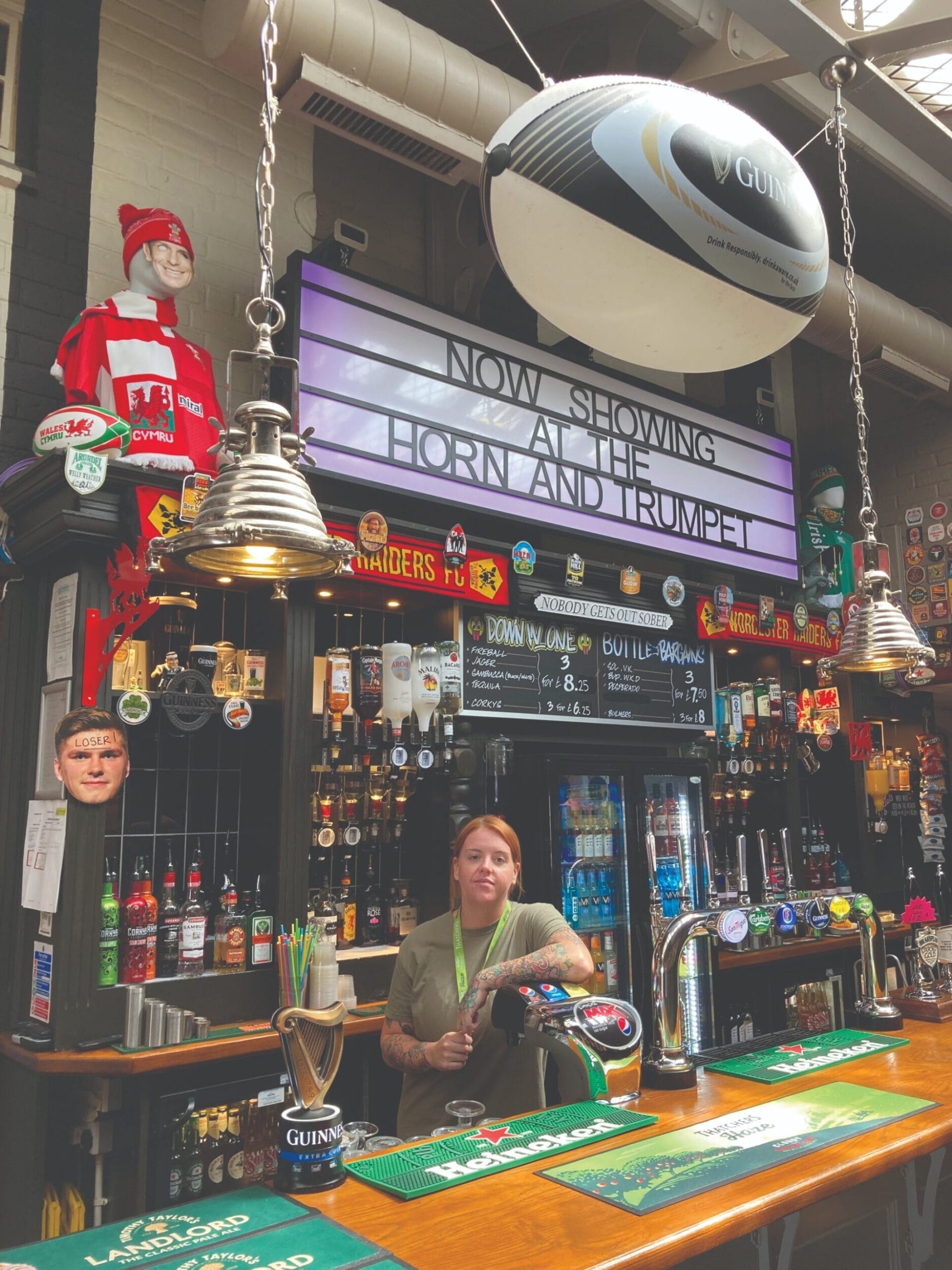
Charlotte Goode worked as a sous-chef for Worcester Warriors before the club went into administration. Photo: Duncan Craig
Worcester feels like a city bereft. Few British high streets are booming these days, but the aptly named Shambles is blighted by boarded-up shop fronts, graffiti and optimistic “to let” signs. It’s not hard to find Warriors fans in the city; like Goode, they still wear the strip – I count three in a 15-minute stroll.
Their overriding emotion is anger at owners Colin Goldring and Jason Whittingham, who took over the club in 2019 – nominated by a four-man consortium that had owned it for just months. Together these parties had weaved a financial web of such baroque opacity that it’s still being unpicked. In its coruscating report, the DCMS summarised the situation thus: “Unscrupulous owners mismanaged club finances while attempting to strip the club of its assets.” Both Whittingham and Goldring have previously denied such claims.
But these aggrieved fans harbour the slimmest of hopes, too. The Atlas Group consortium, which is led by former chief executive Jim O’Toole and ex-professional player James Sandford, is purchasing Sixways from administrators Begbies Traynor Group and holds the Warriors’ intellectual property rights. Could a phoenix-like miracle solution be found?
The prospects are vanishingly small – at time of going to press the period of administration had been extended, with the sale of the club dragging on and Atlas still to find nearly £1.2m to complete the transaction. In addition, the RFU had vetoed Warriors’ involvement in the Championship, the second tier of English rugby; and a proposed merger with semi-professional team Stourbridge and rebranding as ‘Sixways Rugby’, in the hope of the team competing in the fourth tier, had been scrapped. But as that excitable commentator from Worcester’s finest hour would attest, the Warriors have come back from the dead before.
Jonathan Davies’ playing days are far behind him now. In his time, the 60-year-old was the archetypal ‘Welsh wizard’, a mercurial, diminutive fly-half in the mould of the late, great Welsh fly half, Phil Bennett. A TV pundit these days, Davies talks the way he used to play: at pace, jinking between subjects. And he’s close to despondent about the sport he loves.
‘Jiffy’, as he’s known in the game, was appalled at the demise of Worcester. Duckworth, who tried to recruit him as rugby director back in the ’90s, would be “turning in his grave now”, he says, adding that “The problem is no one really talks about the actual game of rugby anymore – just incidents, referees, off-field activities.”
His homeland is far from exempt. Not to be outdone by its great rival across the Severn, Wales orchestrated its own annus horribilis last season, featuring such lowlights as a January 2023 BBC documentary investigating claims of racism, misogyny and homophobia at the Welsh Rugby Union (WRU). And – a month later – a near-boycott of the England international in Cardiff by players over a contract dispute with the WRU and the four cash-strapped regions (the Welsh version of Premiership clubs).
Everything in the game now is driven by money”
It wouldn’t just have been Welsh sponsor Brains Brewery counting the losses if the boycott had gone ahead. “I’m not sure if everyone understood [at the time],” said Wales coach Warren Gatland recently. “But if that game had been cancelled it would have cost the union around £10 million. There’s no doubt in my mind the four regions would have gone to the wall.”
Money has long been a divisive and contentious force in rugby. In Davies’ era there was still a split between the two different ‘codes’ of rugby, which played slightly different versions of the game but had their roots in the perennial tension between those who wanted to keep rugby amateur and those that embraced professionalism. Rugby union had remained amateur, whilst rugby league had long been professional. Davies famously became the highest profile ‘code breaker’ – switching from rugby union to rugby league – in 1989, signing for Widnes for a reputed £200,000 aged just 26. Six years later, rugby union’s insidious creep towards professionalism – which it had resisted for close to a century – was made official.
It’s gone too far, he feels. “Everything in the game now is driven by money,” says Davies. He cites the glut of international games – and the influx of private equity money. Luxembourg-based CVC Capital Partners owns a 14.3 percent share in the Six Nations international tournament (giving it the same voting rights as each of the six competing countries) and a 27 percent share in the Premiership – for which it paid £230 million in 2018. This short-term windfall, largely swallowed up by the impact of Covid, was blamed both for inflating salaries and denuding bottom lines, with the clubs surrendering a quarter of their annual revenue from the likes of TV rights. “CVC have come in but have they got anyone who understands rugby? Or are they just in it to make a few quid?” asks Davies.
Not all rugby’s problems are off the field. Professionalism has brought a quicker and more dynamic game – the painful irony of the Premiership’s hellish season was that the league delivered some of the most exciting rugby ever seen in Britain – but also significantly bigger players and greater physicality. Rugby has moved from a contact sport to an impact sport, with all the concomitant risks.
The scars of a career in rugby – cauliflower ears, extravagantly wonky noses – have long been merrily lampooned. But no one’s laughing when a 45-year-old former international such as 2003 World Cup winner Steve Thompson can’t remember any of the games he played during that tournament and some days forgets even his own wife’s name. Diagnosed with early-onset dementia, Thompson is the highest-profile of more than 200 former players whose brain injury compensation lawsuit against the sport’s governing bodies has reached the High Court.
Faced with a growing number of litigants, in January 2023 the RFU decided to act. But the manner of its intervention left many wondering if it was the RFU Council that was in need of an HIA (head injury assessment). Tackle height in all levels beneath the Championship, it decreed, would be lowered from just under the shoulders to below the waist. The backlash was instant and emphatic. A petition saying the rule change would render the game “farcical” amassed 80,000 signatures. The ruling was criticised for being disproportionate but also ill-directed: a draconian solution to an elite-level problem being visited on the amateurs, where impact injuries, one could argue, are equally likely to happen in the stampede to the bar.
The row-back was swift and humiliating, with the RFU implementing a wide-ranging consultation and saying it was “truly sorry”. Three months later – to the sound of widespread Googling of basic human bone structure – tackle height was raised to “the base of the sternum”. One pundit summarised the debacle best. “It’s just so rugby right now.”
It’s a sunlit Sunday morning in early August in La Rochelle’s Vieux Port, on the west coast of France. In Le Zinc, a bar set back from the waterfront, barman Adrian buzzes around, serving café crèmes and orange juices to well-heeled locals immersed in the sports pages. Like the Horn & Trumpet in Worcester, this too is a rugby pub. Signed shirts hang like portraits. Scarves from big matches line the walls – most prominently from May 2023, when Stade Rochelais beat Leinster in their own backyard to claim the French team’s second successive European title.
More than 40,000 fans dressed in the team’s black and yellow colours flooded into the port to celebrate the success, with dozens hurling themselves into the harbour. “That night was crazy,” says Adrian, with a smile. The runaway success of the city’s rugby club is far from an anomaly in France. In this country, which will host the Rugby World Cup this autumn, the sport is booming. When Duncan Kendall, the vice chair of London Irish’s supporters’ committee, attended the Fédération Française des Supporters de Rugby’s annual conference in Burgundy, he was struck by two things: the solidarity of French fans for “the English Peril”, as an editorial in Midi Olympique, the bi-weekly rugby paper, pithily put it. And the rudeness of the French game’s health.
Average attendances touch 15,000 for France’s Top 14, its elite league, with Union Bordeaux Bègles boasting the largest regular club attendance in the rugby world. Its match against La Rochelle was watched by 41,513 people. France’s second tier, the closely affiliated Rugby Pro D2, has average attendances of 5,000. England’s Championship, meanwhile, won last season by Jersey Reds, averages 1,336 per match, with just 407 watching Ampthill against Doncaster Knights on 18th March.
The reward for such ardent support of the French game isn’t just higher gate revenue, it’s a bigger pot of TV money. In December 2020 BT Sport, now TNT Sports, renewed its Premiership deal for a further three years for a total of £110 million. Three months later French network Canal+ signed a four-year deal with the Top 14 worth just under £100 million per season. And good luck spending beyond your means or furtively asset stripping in the French game. Governance and oversight is rigorous, with France’s 30 professional clubs overseen by the Direction Nationale d’Aide et de Contrôle de Gestion (DNACG) – often referred to as the “financial gendarme” of French rugby.
The 20-minute walk from the Vieux Port to La Rochelle’s ground showcases the best of this historic coastal city: the elegant limestone architecture and arcaded streets; the forest of masts in its vast marina and the sparkling Bay of Biscay beyond. At the Stade Marcel-Deflandre, sprinklers hiss and there’s a clatter of hard-hatted workers putting the finishing touches to an expansion project that will squeeze 500 more supporters into this 16,000-seat ground; a run of more than 80 consecutive sell-outs mean tickets to watch a game here are like gold dust. Even off-season, shuttered, the ground exerts an aura.
You have to be strong off the pitch as well as on it”
A cab draws up and a family alight, the son’s build suggestive of a rugby pedigree. Robin Teston-Vigne – a promising 20-year-old fly-half, it transpires – is on holiday from Avignon with his father Frédéric and mother Cecile, and on a rugby pilgrimage. The family peer through the locked gates and take a few photos.
They’ve heard of English rugby’s plight – and joie-maligne is the last thing on their minds. “When you have big rivals like England struggling it’s not good for either of us,” says Frédéric. “It reminds me of the situation in French rugby a few years ago but now it’s very controlled here. French flair by itself is no good; you have to be strong off the pitch as well as on it.” He adds: “In English rugby, the money goes up and up and up and then…” He makes the sound and gesture of a jet hurtling downwards.
In English rugby’s death-spiral season, there was at least one positive: the continued flourishing of the women’s game. When England contested the Women’s Rugby World Cup final in New Zealand in November 2022 it was in front of a world record crowd of 42,579. A few months later, in the Women’s Six Nations game between England and France, this figure was obliterated, as 58,498 fans converged on Twickenham. There were record attendances, too, for the Allianz Premier 15s – the women’s Premiership – while the RFU aims to grow the number of female players to 100,000 by 2027, a fourfold increase in ten years.
This astonishing growth trajectory, one of the steepest in any sport, is something Jo Yapp is hoping to tap into. The former England and Worcester Warriors player is now the club’s director of rugby. She is attempting to work a minor miracle in the west Midlands – ensuring the continuity of top-flight rugby at Sixways. When the Warriors were plunged into administration, the women’s team Yapp coaches were suspended from all competitions and shut out of the stadium with everyone else. The financial backing of sports management business Cube International, along with fundraising to get them through the summer, saw the Allianz Premier 15s welcoming them back as an independent entity. Though they will play in Warriors colours and with home games at the cavernous Sixways.
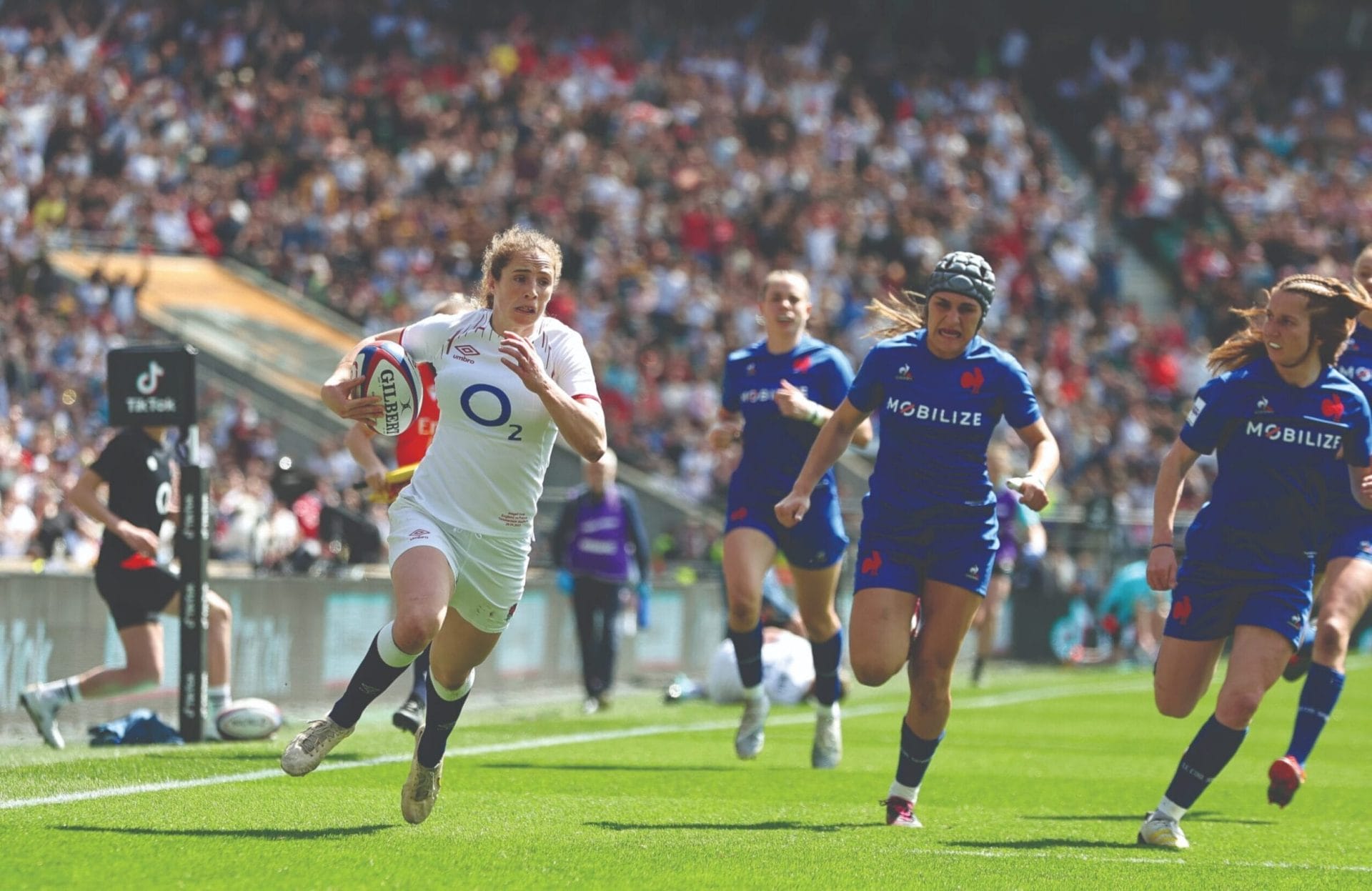
Abigail Dow of England breaks clear to score the team’s first try during the Women’s Six Nations match against France, 29th April 2023. The game was played in front of a record crowd of 58,498 at Twickenham Stadium. Photo: David Rogers/Getty Images
“It’s really exciting but it can also feel a little bit scary because we’ve got to drive this,” says Yapp. The former scrum-half cuts a slight figure in a sprawling office in Sixways’ deserted West Stand. Huge windows frame the 4G synthetic pitch and the word “Warriors” is spelled out in towering gold letters on the eight banks of blue seats opposite. It’s nearly a year since the ground was effectively abandoned; a few flags flutter desultorily on the gates, and in the Sixways Store naked mannequins are strewn around like they’ve just finished tackle practice.
You can’t rely on rich owners to keep bailing people out. The game’s on a knife edge”
Yapp’s is a tricky path to navigate – Warriors is a potent brand locally but also a tainted one. Dispirited fans crave the return of Sixways rugby but no one can pretend this represents a straight like-for-like replacement. Memories of huge crowds, high-stakes contests and British & Irish Lions – an all-star joint team of players from England, Scotland, Wales and Ireland – playing here are still fresh. “We’d love to be able to sell this place out. That absolutely has to be our ambition,” says Yapp. “But we have to grow in a sustainable way. You can’t rely on rich owners to keep bailing people out. The game’s on a knife edge.”
And that’s surely rugby’s biggest challenge now: to shake off its quicksand-investment reputation, its reliance on white knights such as Duckworth and Crossan. To follow the French model and shore up the financial oversight and governance to ensure players and fans are protected. Plus also, quite simply, to get more bums on seats.
A bit of self-promotion ought to help. The consensus is that the sport, less intrinsically brash than football, needs to get better at selling itself. Netflix’s big-money Six Nations docuseries released next year – think Drive to Survive with gum shields – is a good start.
Asked about this profile problem in a podcast, boxing promoter Eddie Hearn was characteristically forthright. “Stars are the most important thing. In professional rugby I couldn’t name you half a dozen players now and that’s frightening. When you learn about the characters, you want to watch them, and when you create heroes you drive the grassroots side of the game.”
London Irish wasn’t short of stars, or at least stars in waiting. Now they’re scattered far and wide – exiled Exiles. Henry Arundell, the brightest prospect in English rugby, lines up this season not in Irish’s green, but in the colours of Paris-based Racing 92. Duncan Kendall will cheer on Arundell’s progress from afar. But he still has the conundrum of what to do with those empty Saturdays, Sundays and occasional Friday nights. Some fans are throwing their support behind the London Irish amateur club, the Wild Geese, which play in Regional 2 Thames, the sixth tier of English rugby. Third-tier Rams RFC, based near Reading, offer at least the prospect of regular rugby for him, he says, with little enthusiasm.
Kendall is not yet sure how he will fill the void, but there’s one thing he is certain about: he’s going to try to ignore the Premiership. Emotions are simply too raw. “The past year has been appalling,” he says. “I really wouldn’t wish it on anyone. Not even a Harlequins supporter.”
Slow Journalism in your inbox, plus infographics, offers and more: sign up for the free DG newsletter. Sign me up
Thanks for signing up.
